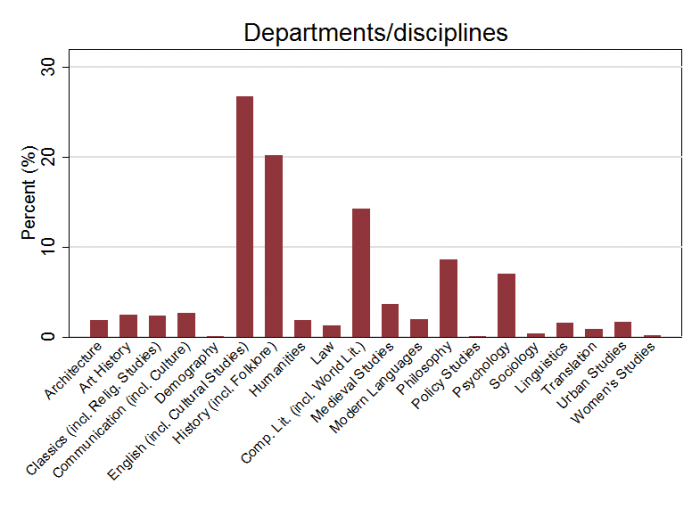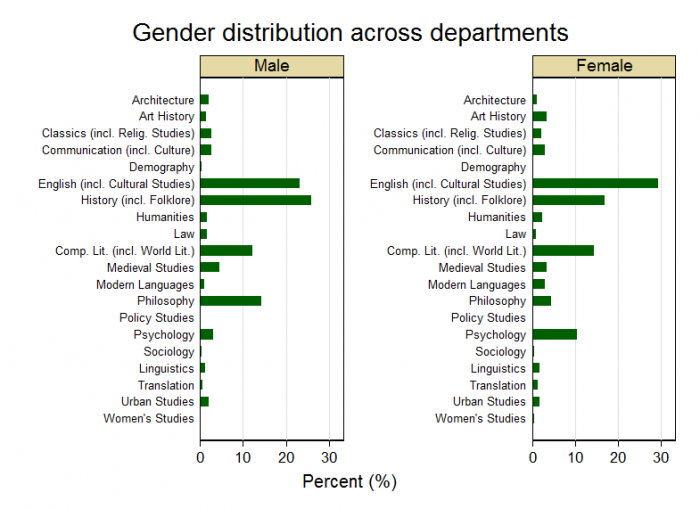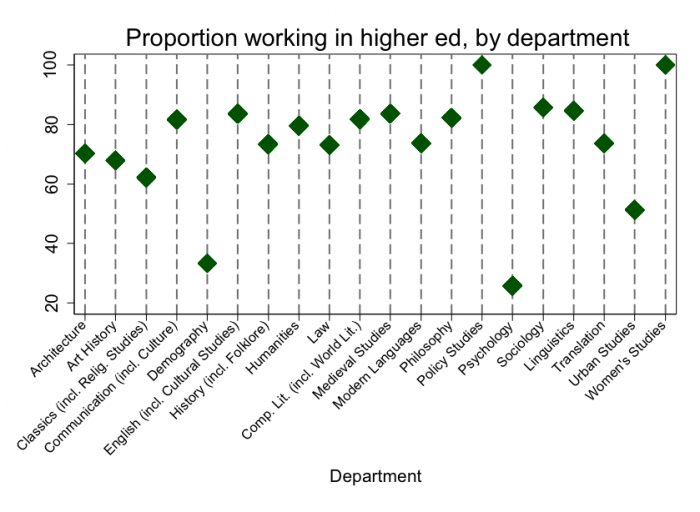We grouped the many departments in our sample into 20 overarching disciplines. As we mention in a previous post, our sample contains an especially high number of grads from English (including Cultural Studies), History (including Folklore), and Comparative Literature (including World Literature) programs. Together, these grads account for 61% of our total sample: 27% from English, 20% from History, and 14% from Comparative Literature. The overall distribution of disciplines in our sample varies slightly by gender, as we demonstrate below.


We wondered if the proportion of grads working in higher education varies by discipline in our sample. Here’s what we found:

There are a few important things to note about this plot. The majority of grads from most disciplines are employed in higher education, which aligns with our descriptive analysis of the overall sample. However, there are a few notable outliers. In particular, we have very few grads from Policy Studies, Women’s Studies, and Demography; although these proportions are striking, they are statistically non-informative.
The comparatively low proportion of Psychology grads working in higher education is interesting. We’ll take a closer look at these grads next time, and we’ll continue our analyses of employment trends by discipline.
We grouped the many departments in our sample into 20 overarching disciplines. As we mention in a previous post, our sample contains an especially high number of grads from English (including Cultural Studies), History (including Folklore), and Comparative Literature (including World Literature) programs. Together, these grads account for 61% of our total sample: 27% from English, 20% from History, and 14% from Comparative Literature. The overall distribution of disciplines in our sample varies slightly by gender, as we demonstrate below.


We wondered if the proportion of grads working in higher education varies by discipline in our sample. Here’s what we found:

There are a few important things to note about this plot. The majority of grads from most disciplines are employed in higher education, which aligns with our descriptive analysis of the overall sample. However, there are a few notable outliers. In particular, we have very few grads from Policy Studies, Women’s Studies, and Demography; although these proportions are striking, they are statistically non-informative.
The comparatively low proportion of Psychology grads working in higher education is interesting. We’ll take a closer look at these grads next time, and we’ll continue our analyses of employment trends by discipline.
Discussion
Psychology is due the high percentage of PhDs seeking employment as Clinical Psychologists, rather than academics. Clinical Psychologists not only work in private practice but also in many other institutional settings (hospitals, corrections, schools, …).
Thanks for your comment! We were actually able to illustrate this when we took a closer look at our sample’s Psychology grads (part two of our series on employment by discipline). Career trends among these grads are clearly quite different from other grads in our cohort, as you’ve noted above.
Hello,
I am a Social Work PhD graduate from 2014. I am currently in a tenure-track position in the Faculty of Social Work at the University of Manitoba. I am disappointed that there is no reference to Social Work in your data – wondering if you could explain. Did grads from our profession simply not participate in your study?
Looking forward to your clarification.
Regards
Dr. Tracey A Bone,
Great point – we do not (currently) have data on Social Work grads, but this was not an intentional omission. This was a pilot project; each institution in our sample self-selected two departments for inclusion, so gaps in our data (disciplinary and otherwise) were somewhat inevitable. The good news is that we plan to expand our data collection efforts, and we’ve clarified that disciplines in the social sciences are indeed eligible for inclusion. We’re looking forward to building a more comprehensive and inclusive dataset in the near future. Thanks for your feedback!